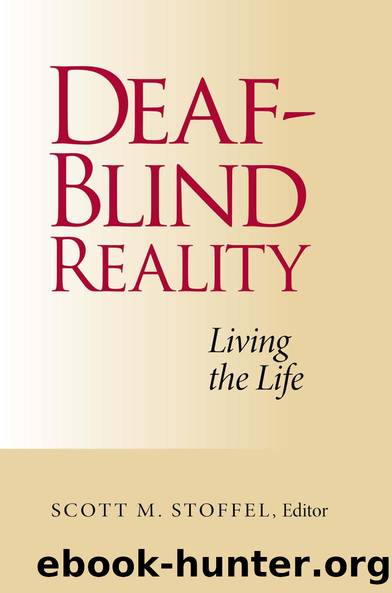Deaf-Blind Reality by Scott M. Stoffel

Author:Scott M. Stoffel [Stoffel, Scott M.]
Language: eng
Format: epub
Tags: Psychology, Ethnopsychology, Social Science, Ethnic Studies, General, People With Disabilities
ISBN: 9781563685354
Google: owVDLgEACAAJ
Publisher: Gallaudet University Press
Published: 2012-01-15T04:02:18+00:00
7
Education Part II: Adult Education
In chapter 2, the panelists discussed their primary and secondary schooling experiences. Adult education, which includes college, technical or business schools, and work training programs, differs significantly from early education, so it is covered here as a separate topic.
One notable difference between early and adult education is that challenged individuals must actively seek disability accommodations and advocate for themselves more. Parents or counselors may still be involved, but individuals must take charge and begin to steer their own ships, so to speak.
Finding direction and purpose in continued education is another issue. Many people with sensory disabilities struggle to figure out what they can do with their lives, what types of work they are physically capable of, and how they will live independently, in addition to finding ways to effectively participate in college and other forms of adult education. This goes far beyond the normal dilemma of discovering oneâs niche; itâs a double challenge that can be quite daunting.
Angela C. Orlando
Pursuing special education at Kent State University was a breeze for me, academically. I had already learned how to teach myself from textbooks, so I was well prepared for what was expected of me in class. I had good study habits. I could write clearly and scored high on tests. I spent all my time outside of class doing homework and studying. The library and student center study lounge were my favorite places on campus.
At the start of each semester, I told my professors that I was hard of hearing. This never really caused much of a reaction from them. Theyâd say, âOkay,â and pretty much forget about it. I sat up front and looked like I was paying attention. But, in truth, I had no idea what was being said and was usually daydreaming. Disabled Student Services (DSS) sent out notices to each of my professors, saying that a note-taker would be needed for the class. The professors were instructed to read this notice to the class, and interested people would call DSS. They made all the arrangements for me and paid for the note-taker. All the note-takers had to do was use special carbon-copy paper that I gave them in order to make two copies of their notes. Some note-takers were really good; some were awful. But I never complained.
I had a problem once with a professor teaching a summer computer workshop. This was at the College of Education, and he just happened to be the head of deaf education at Kent State. His assistants were all deaf ed grad students. I wasnât a deaf ed major and had never met him before this. When I told him I was hard of hearing and would need a note-taker, he said, âNo, note-takers wonât work for this class. You have to have an interpreter.â I explained that I didnât know sign language; all I needed was information in writing. But he wouldnât allow it. After the first class, the professor contacted DSS and arranged for an ASL interpreter.
Download
This site does not store any files on its server. We only index and link to content provided by other sites. Please contact the content providers to delete copyright contents if any and email us, we'll remove relevant links or contents immediately.
The Art of Thinking Clearly by Rolf Dobelli(10489)
The 5 Love Languages: The Secret to Love That Lasts by Gary Chapman(9815)
Mindhunter: Inside the FBI's Elite Serial Crime Unit by John E. Douglas & Mark Olshaker(9344)
Becoming Supernatural by Dr. Joe Dispenza(8217)
Nudge - Improving Decisions about Health, Wealth, and Happiness by Thaler Sunstein(7709)
The Road Less Traveled by M. Scott Peck(7603)
Mastermind: How to Think Like Sherlock Holmes by Maria Konnikova(7347)
Enlightenment Now: The Case for Reason, Science, Humanism, and Progress by Steven Pinker(7314)
Win Bigly by Scott Adams(7199)
The Way of Zen by Alan W. Watts(6614)
Factfulness: Ten Reasons We're Wrong About the World – and Why Things Are Better Than You Think by Hans Rosling(4742)
The State of Affairs by Esther Perel(4721)
Gerald's Game by Stephen King(4654)
Man's Search for Meaning by Viktor Frankl(4607)
The Confidence Code by Katty Kay(4262)
Thinking in Bets by Annie Duke(4227)
The Healing Self by Deepak Chopra(3580)
Hidden Persuasion: 33 psychological influence techniques in advertising by Marc Andrews & Matthijs van Leeuwen & Rick van Baaren(3566)
The Worm at the Core by Sheldon Solomon(3487)
